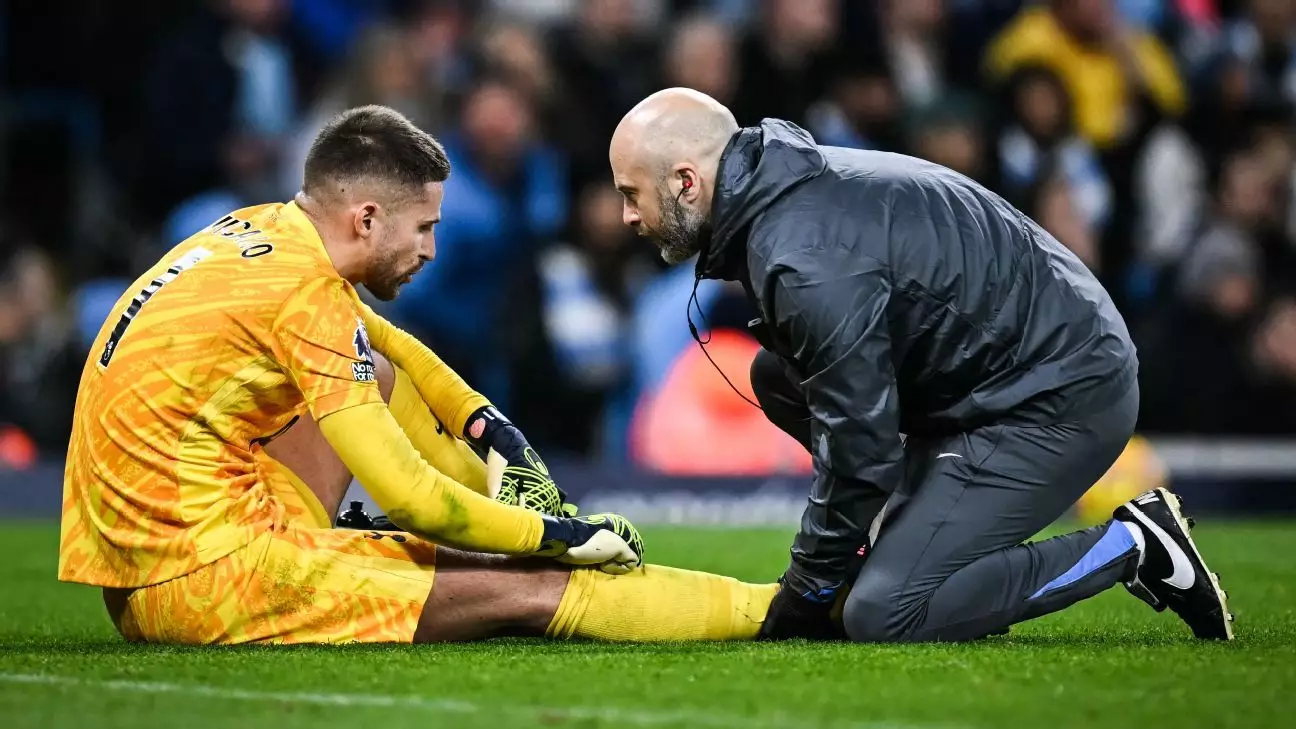Tottenham Hotspur’s recent victory over Manchester City has been overshadowed by a significant injury to goalkeeper Guglielmo Vicario, who suffered an ankle fracture during the match. The revelation of this injury stunned manager Ange Postecoglou, who praised Vicario’s resilience in continuing to play through the pain. Despite sustaining the injury from a collision shortly before the halftime mark, Vicario showcased remarkable tenacity, remaining on the pitch for the entire match and making several crucial saves that ultimately contributed to Spurs’ 4-0 triumph.
The injury and subsequent surgery underscore the physical toll competitive football exerts on players and raise questions on the best practices for injury management within teams. Vicario’s dedication to playing through such an injury no doubt speaks volumes about his character and commitment to the squad. However, it also highlights the precarious nature of the game: that a player’s sacrifice can lead to long-term consequences, as Vicario is set for an extended recovery period.
In his media address, Postecoglou expressed shock at the severity of Vicario’s condition, a sentiment that reflects a deeper understanding of team dynamics. The fact that Vicario was able to push through 90 minutes of intense football with a fractured ankle is not only a testament to his physical toughness but also speaks to the culture and unity within the squad. Such incidents can either be rallying points or sources of tension within a team; in this case, Postecoglou’s comments suggest an environment that fosters resilience and commitment among players.
Vicario’s injury also raises questions about replacements and the challenge of maintaining momentum in the league. At this point, Postecoglou will need to look towards experienced backup Fraser Forster to fill the void left by Vicario. Forster, who has had prior experience with similar high-pressure situations, will now have the opportunity to step up and become a pivotal figure in a key moment of the season.
With Vicario sidelined for a considerable amount of time, Tottenham faces the immediate challenge of squad depth. The decision to not look for a free agent to mitigate the loss of Vicario indicates a trust in the capabilities of the current roster, particularly in Forster’s ability to keep goal effectively during this critical juncture. This strategic choice also reflects on Postecoglou’s confidence in building a cohesive unit that employees its resources effectively rather than relying on external acquisitions during moments of difficulty.
However, as marketed as a formidable option, the question remains whether Forster can replicate Vicario’s performance levels consistently. The coming matches will be vital for both Forster and Postecoglou to ensure that Spurs do not falter during this transitional phase. Tottenham’s positioning in the Europa League adds an extra layer of pressure as they prepare to face formidable opponents such as AS Roma.
Even amid this setback, the outlook for Tottenham remains cautiously optimistic. Postecoglou’s acknowledgment of Vicario’s development as a leader showcases not just his performance on the pitch but also the broader narrative of growth and potential for younger players within the team. This injury might be a temporary challenge, but it also serves as a moment for others to step into leadership roles and demonstrate their credentials under pressure.
The upcoming clash against Roma, under the seasoned coaching of Claudio Ranieri, will serve as an excellent litmus test for Spurs’ adaptability in the face of adversity. The experience and wisdom of Ranieri will undoubtedly present challenges, yet for Postecoglou, the game is an opportunity to forge new paths and facilitate player growth.
While Vicario’s injury is undeniably a blow to Tottenham, it also opens avenues for introspection and resilience within the squad. The real test lies ahead as players step up to fill the gaps left by injuries and strive to keep the team’s ambitions alive in the ongoing season.
